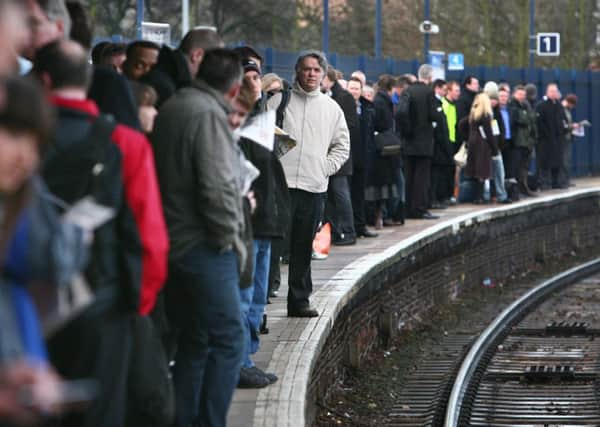Timetables now ‘works of fiction’ as even fewer passengers satisfied with ‘racketeering’ train companies


A huge survey of 27,000 passengers found that 81% expressed satisfaction with their journey when questioned last autumn, 2% down on the previous autumn.
The study, by watchdog Passenger Focus, did not include the Christmas period, when trains into London King’s Cross were seriously disrupted.
Advertisement
Hide AdAdvertisement
Hide AdPassengers have also suffered delays and cancellations in several parts of the country since the start of this year because of signalling and other problems.
Satisfaction levels varied between 74% and 94% for different train companies, with the highest-scoring operators at 94% Heathrow Express and Grand Central, which runs trains between Yorkshire and London.
The lowest-scored were Govia Thameslink and Southern (both with 77%) and Southeastern (74%).
Southeastern’s overall satisfaction score fell 11% compared to a year ago, while Cross Country’s dropped 4% in a year.
Advertisement
Hide AdAdvertisement
Hide AdAnthony Smith, chief executive of Passenger Focus, said: “Rail passengers’ satisfaction is driven by getting trains on time. Many are being let down - fare increases, billions in Government investment and promises of improvement don’t seem to be delivering change on the ground.
“The high-profile disruption after Christmas and at London Bridge will only have added to the gloom.
“Passengers do not care who is to blame for things going wrong and for some of them the timetable is a work of fiction. If it really is the case that better day-to-day performance can’t be achieved, then an honest, open debate is now needed so that passengers might be able to trust the promises made by the industry again.”
The number of passengers who believed their trains were punctual and reliable also fell by 2%, to 77%.
Advertisement
Hide AdAdvertisement
Hide AdThe only areas where satisfaction improved were shops, eating and drinking facilities and other services at railway stations.
There was a decline in other areas monitored, including train speed and enough room to sit down or stand on a train.
Fewer than half of passengers believed fares offered value for money, similar to the previous year.
In London and the South East, there were declines in satisfaction with the helpfulness and attitude of staff as well as how train companies dealt with delays.
Advertisement
Hide AdAdvertisement
Hide AdOnly three out of four passengers in London and the South East were satisfied with punctuality.
Manuel Cortes, leader of the Transport Salaried Staffs Association, said: “It is hardly surprising that passenger satisfaction is falling when commuters are paying record high fares for a worsening service.”
Michael Roberts, director general of the Rail Delivery Group, representing rail operators and Network Rail, said: “These results show how passenger satisfaction has been dipping after years of steady improvement and they reinforce our determination to do better.”
Rail Maritime and Transport union general secretary Mick Cash said: “It defies belief that constantly-failing train companies are allowed to hang on to their money-spinning franchises while passenger anger reaches boiling point. The only solution is to end the 20 years of private racketeering and return the whole railway to public ownership.”
Advertisement
Hide AdAdvertisement
Hide AdRail Minister Claire Perry said: “We are investing record amounts of money in our railways to improve journeys for passengers. But this welcome long-term investment has to be made in a way that does not mean unacceptable delays for passengers travelling today.
“These statistics show that Network Rail and many train operators have to work together to improve reliability and communications around delays. I want passengers to see and feel the benefits of this huge investment as soon as possible.”
John Larkinson, of the Office of Rail Regulation, said: “We know that how the rail industry deals with delays is a big cause of passenger dissatisfaction.
“So we remain concerned that a quarter of passengers are still unhappy about this, despite recent initiatives to improve information during disruption.
“This demonstrates the importance of the industry delivering further improvements faster, so passengers get accurate and timely information if trains are delayed.”